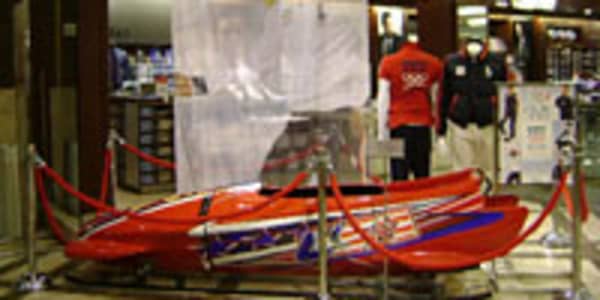VANCOUVER, British Columbia — Josie Lombardi came downtown this week for a taste of the Olympics accompanied by a friend rather than her husband, because he is on an Olympics boycott.
She was thrilled to see the Olympic caldron up close, she said, but after being told she would have to wait five hours to see an exhibit of Olympic medals, Mrs. Lombardi began to think her husband might have a point.
“O.K., are the Olympics worth it?” Mrs. Lombardi said while stopping for lunch at Murchie’s, a venerable tea and coffee shop. “I don’t want to be too negative because there’s good and bad, but I have to agree with my husband. All he can talk about is the debt. I’m worrying about what’s going to happen next.”
While hundreds of thousands of people have streamed onto the streets to enjoy (some of them to excess late at night) the Olympic party, there is still an undercurrent of crankiness and apprehension in the city.
Vancouver was always an odd choice to become the world’s winter sports capital for two weeks. Among Canadians, it is best known as the nation’s winter avoidance capital. But the misgivings among residents began even before this winter’s unseasonable warmth and sunshine bathed the city’s renowned parks and gardens, bringing daffodils and flowering trees bursting into glorious February bloom.
Well before the Games began, the global recession pushed several of the Games’s sponsors, including Nortel Networks and General Motors, into bankruptcy. Whistler Blackcomb, the resort that is hosting the Alpine skiing events, will soon be sold at auction.
Security costs, first estimated at $165 million, are now headed toward $1 billion.
Still, organizers insist the operating budget will break even. But that forecast includes $423 million in emergency money from the International Olympic Committee, and detailed financial information will not appear until after the Games are over.
As for Vancouver’s municipal government and the taxpayers, the bad news is already in. The immediate Olympic legacy for this city of 580,000 people is a nearly $1 billion debt from bailing out the Olympic Village development. Beyond that, people in Vancouver and British Columbia have already seen cuts in services like education, health care and arts financing from their provincial government, which is stuck with many other Olympics-related costs. Many people, including Mrs. Lombardi, expect that more will follow.
While the mood in the city has picked up since the start, when many people were suffering a severe case of buyer’s remorse, the looming budget realities make it unlikely that all will be forgiven or forgotten.
“While it’s very hard to see all the costs, I think people are going to pay for it for a long time,” said Lee Fletcher as he walked past several flowering cherry trees near his apartment outside Stanley Park, a large tract of forest tucked up against the city’s downtown. “Some people are going to benefit hugely, not the average guy. The average guy is going to see his taxes increase.”
The average guy, who cannot easily afford Olympics tickets (even attending the medals ceremonies costs $21, plus service charges), has had other reasons to complain. The flaming caldron that Mrs. Lombardi admired was initially hidden behind a chain link fence that evoked a medium-security prison. And until local spirits were dampened by the Canadian hockey team’s loss to the United States, a large section of downtown was overrun nightly by boisterous, hollering celebrants, an astonishing number of whom were drunk.
The task of defending the Olympics has fallen to Vancouver’s mayor, Gregor Robertson, who won office in large part because of a voter revolt over the Olympic Village that led voters to dump the right-of-center party that brought the Games to town.
The real estate development industry, which is unusually powerful in Vancouver, provided the city with an Olympic Village plan that seemed — and ultimately was — too good to be true. A development firm would finance and build the village on a desirable piece of city-owned land. After the Games, the developer would convert the accommodations into luxury condominiums and pay the city for the property. Vancouver would get its village and turn a profit as well.
But cost overruns, combined with the credit crisis in 2008, destroyed the financing. Once in office, Mr. Robertson had to obtain special permission from the province to borrow $434 million to complete the village. In all, the city is responsible for about $1 billion in development costs, a situation that lowered its credit rating.
If Vancouver’s real estate market remains strong, the city may recover most of that money. If not, Mr. Robertson said, “the city is on the hook for some hundreds of millions of dollars.”
Stuck with the Olympics, Mr. Robertson is trying to wring all that he can from the Games and its related publicity for Vancouver, an unusually attractive city that shows well on television. But even some of mayor’s supporters now worry that that the Olympics may prove to be more of a burden than an opportunity.
“It’s going to be very tight financially,” said Chris Haddock, the producer and writer of a critically acclaimed television series about Vancouver politics that was broadcast by the Canadian Broadcasting Corporation. “Some of the things they want to do, and want to prove, will have to be put off.”
Mr. Robertson is candid about the city’s potential Olympic problems but he doggedly steers any conversation back toward his goal of using the Olympics to attract investments from companies in the environmental sector to make the city a green technology center.
Kennedy Stewart, a professor of public policy at Simon Fraser University in suburban Vancouver who has written extensively about the city’s politics, remains unconvinced that showing potential investors a good time during the Olympics will resolve Vancouver’s long-term economic issues. The forestry industry, once the mainstay of its economy, has been devastated by a beetle infestation, the collapse of the housing market in the United States and competition from South America. While motion picture production companies and software developers have set up shop here in recent years, they lack the same economic impact.
“What’s the substantive thing Vancouver has to offer other than its nice mountains and vastly overpriced real estate?” Professor Stewart asked. “The forestry industries have collapsed, so where is the money going to come from other than marijuana grow-ops?”




